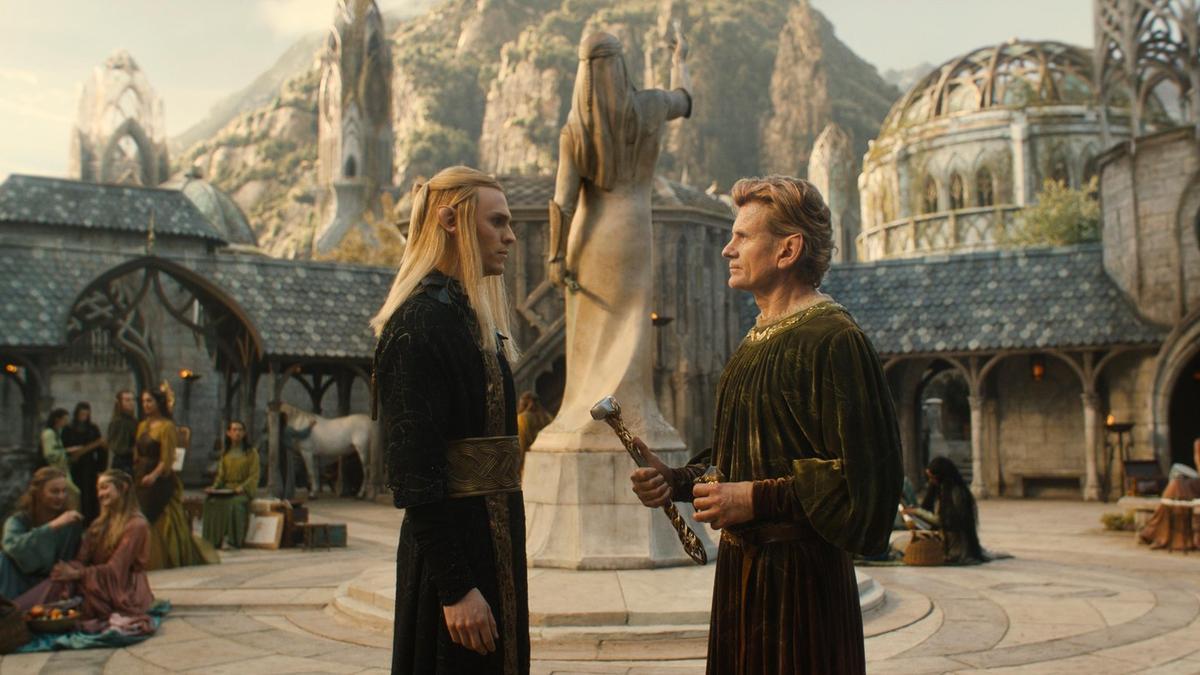
The season finale of The Rings of Power’s highly anticipated second outing may not have answered every burning question fans had hoped, nor did it entirely quell the restless Tolkien purists. However, it achieved something almost as monumental: it transformed the show from feeling like an extravagant, billion-dollar experiment into a vivid chronicle of Middle-earth, teeming with life. Initially criticized for being a splendid yet uneven effort to recapture the magic of Tolkien’s universe, the series has evolved into a bold, richer narrative. After a tentative first season that seemed hesitant to embrace its own grandiosity, the showrunners decided to fully commit to the sprawling scale and intricate lore of Tolkien’s work, yielding a finale that was nothing short of an epic crescendo.
This sophomore season took on board many critiques from its debut and demonstrated clear course correction in the finale. Season one had all the features of a colossal TV spectacle — expansive landscapes, flawlessly executed CGI, and, naturally, the heavy weight of Tolkien’s legacy looming over it. Despite its beauty, it felt somewhat stifled by its own expectations, like a gilded cage. Yet, guided by a seemingly benevolent Dark Lord, the series seems to have broken free from these constraints.
Characters and subplots that previously felt marginal now come together in a way that strengthens the show’s central themes, particularly concerning power, corruption, and the allure of evil. This has resulted in a narrative that is more cohesive, although it still has room for refinement. This season, Sauron’s presence is even more dominant. Charlie Vickers delivers “the great deceiver” through a sophisticated portrayal of villainy — charmingly deceitful and with a mask so convincingly presented. Equally compelling is Charles Edwards’ Celebrimbor, a visionary driven by faith and ambition, yet unaware of the trap closing around him. Their interactions create a tragic dance of trust and deception, with Celebrimbor’s subtle unraveling echoing Sauron’s insidious grace. The revelation of Sauron’s true identity is not a shocking twist but a slow, deliberate entrapment leading up to the finale, turning The Rings of Power into an intimate psychological tragedy under epic circumstances.
The expansive, battle-focused finale exceeded expectations in delivering spectacle, and here, the series vastly outperformed most of its fantasy competitors. Whether it’s the radiant aura of war-torn Eregion or the resounding clash with Durin’s Bane in the depths of Khazad-dûm, the visual execution in this finale is nothing short of phenomenal. Amid the fiery skirmishes and collapsing fortresses, the story manages to maintain emotional depth — particularly in the relationship between Prince Durin IV (played by Owain Arthur) and his father, King Durin III. Despite its brevity, their strained yet poignant bond, shaped by duty and inherited stubbornness, adds a humane touch to moments otherwise dominated by Balrogs and mithril mines.
While many new fantasy series strive to ground themselves in gritty realism as a means of establishing legitimacy, The Rings of Power takes a different approach by wholly embracing the enchanting beauty of Middle-earth.
. It invites viewers to be swept up in its sheer wonder, from witnessing the celestial brilliance of Valinor to marveling at the deceptive shimmer of molten mithril. There’s an inherent purity to this world, a refusal to dampen the magic for so-called prestige. Even when the plot falters, the grandeur remains untarnished.
This is where the show truly shines. Although The Rings of Power may not cater to everyone’s tastes — especially those who lean towards the darker realities of a setting like Westeros — it beckons viewers back to the age-old awe of fantasy. It evokes the lost art of believing in the extraordinary, immersing us in a world where the battle between good and evil is still an unforgettable escapade — complete with unrivaled beauty, danger, and wonder.
Throughout stunning backdrops, from the golden woods of Lindon to the resplendent dunes of Rhûn, The Rings of Power never fails to astonish its audience.
Despite its triumphs, the series still grapples with a few weaker elements. The Harfoots, given little screen time in the finale, continue to feel somewhat disconnected from the main narrative, their arc appearing to be a whimsical add-on to the generally somber tone. It’s likely their relevance will diminish in future seasons.
Equally bittersweet was the fitting conclusion to Sam Hazeldine’s Adar, whose departure left a poignant mark with his outstanding performance. Despite this, audiences were treated to a rather clumsy “Grand-Elf” reveal — a long-awaited disclosure that ultimately landed with less impact than intended.
As the curtain falls on the second season, it’s apparent that The Rings of Power has learned valuable lessons from its initial stumbles. The series has grown more confident in its storytelling, character development, and its unapologetic embrace of Middle-earth’s expansive mythos. Though it may never escape the shadow of Peter Jackson’s films, the show is forging its own path. Middle-earth remains a haven of wonder, danger, and irresistible charm. And for that, viewers have much to be thankful for.
All episodes of The Rings of Power are available to stream on Amazon Prime Video.
Published on October 03, 2024, 04:09 pm IST.












